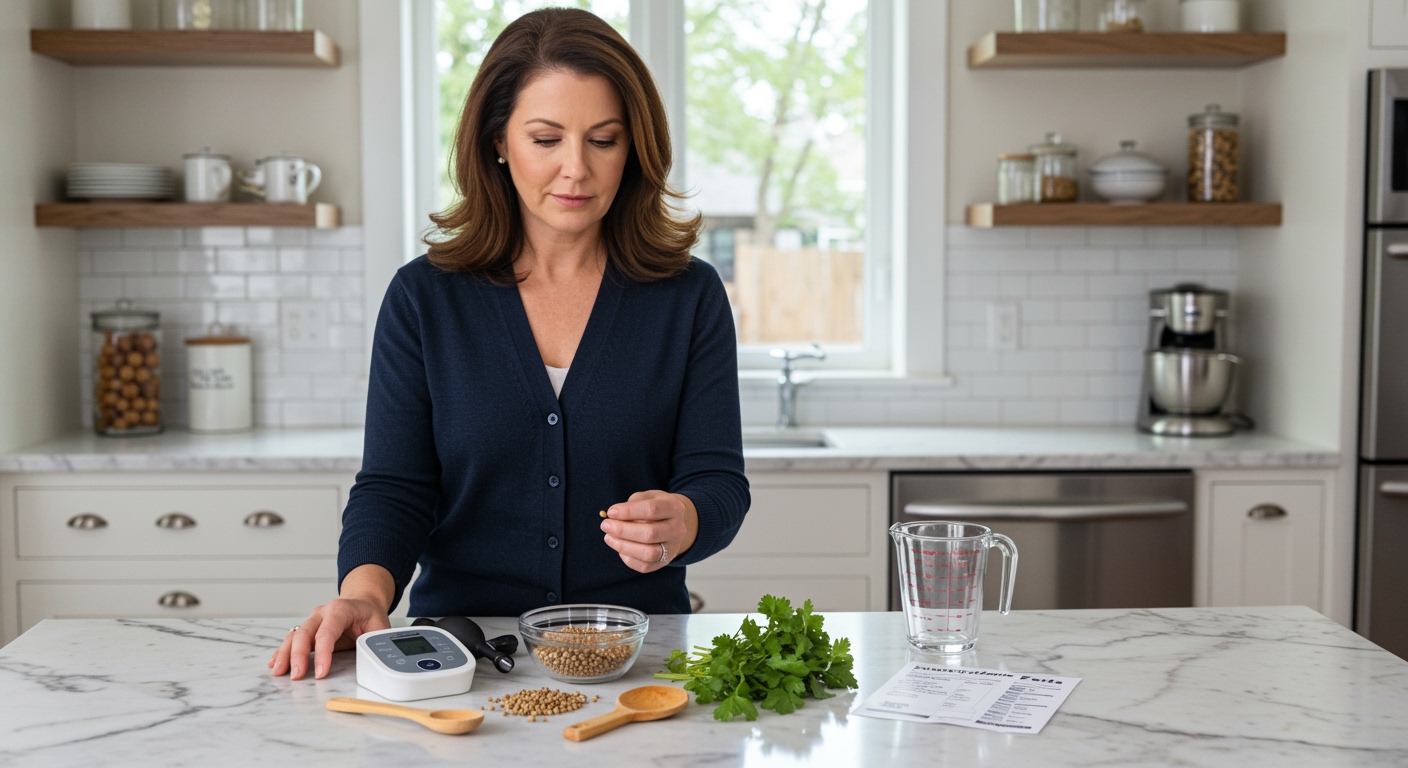✪ Key Takeaway: Low blood pressure patients can safely consume coriander seeds in normal culinary amounts without significant risk.
Introduction
Your doctor just told you that your blood pressure runs low, and now you question every spice in your kitchen cabinet.
You might be wondering if coriander seeds will make your already low blood pressure drop even further and cause dangerous symptoms.
Hi, I am Abdur, your nutrition coach and today I am going to explain whether low blood pressure patients should avoid coriander seeds and what the science actually says about this common concern.
What Do Coriander Seeds Actually Do To Blood Pressure?
Coriander seeds contain compounds called flavonoids and phenolic acids that may influence cardiovascular function.
Research shows these compounds can have a mild diuretic effect, which means they help your kidneys remove excess sodium and water from your body.
This diuretic action typically leads to a modest reduction in blood pressure, but the effect is much weaker than prescription medications.
Studies indicate that coriander seeds may lower systolic blood pressure by approximately 2-4 mmHg when consumed regularly in therapeutic doses.
However, normal culinary use involves much smaller amounts that produce minimal blood pressure changes.
The active compounds in coriander seeds work by relaxing blood vessel walls and improving circulation, but this mechanism requires consistent consumption of concentrated amounts.
✪ Fact: Coriander seeds contain linalool, a compound that may help regulate blood pressure naturally.
How Much Coriander Seeds Cause Problems For Hypotension?
The amount of coriander seeds that could potentially affect blood pressure significantly exceeds normal cooking quantities.
Most recipes call for 1-2 teaspoons of ground coriander or whole seeds, which equals about 2-4 grams.
Research studies that showed blood pressure effects used doses ranging from 15-30 grams of coriander seed extract daily.
This means you would need to consume approximately 8-15 times the normal culinary amount to see significant blood pressure changes.
Even if you ate coriander seeds every day in normal cooking amounts, the cumulative effect on blood pressure would be minimal for most people.
Your body also develops tolerance to many plant compounds over time, which further reduces their physiological impact with regular consumption.
People with severe hypotension who experience dizziness or fainting should still monitor their response to any dietary changes, including increased spice consumption.
✪ Pro Tip: Start with small amounts of coriander seeds and monitor how you feel after meals.
What Are The Real Risks For Low Blood Pressure Patients?
The actual risks of coriander seeds for hypotensive patients are extremely low when used in normal cooking.
Your blood pressure naturally fluctuates throughout the day by 10-20 mmHg due to factors like posture, stress, and meal timing.
The small blood pressure effect from culinary amounts of coriander seeds falls well within this normal variation range.
More significant risks come from concentrated supplements or extracts that contain much higher doses of active compounds.
People taking blood pressure medications should be more cautious because the combined effect could potentially cause excessive lowering.
However, if you only use coriander seeds as a cooking spice, the interaction risk remains very minimal.
The bigger concern for hypotensive patients is avoiding rapid position changes and staying properly hydrated rather than worrying about cooking spices.
✪ Note: Always inform your doctor about all supplements and herbs you consume regularly.
Should You Completely Avoid Coriander Seeds?
Complete avoidance of coriander seeds is unnecessary for most people with low blood pressure.
These seeds provide valuable nutrients including vitamin C, dietary fiber, and antioxidants that support overall health.
The anti-inflammatory properties of coriander seeds may actually benefit cardiovascular health in the long term.
Instead of avoiding them completely, focus on using moderate amounts and paying attention to how your body responds.
If you experience increased dizziness or fatigue after eating meals with coriander seeds, then consider reducing the amount temporarily.
Most people can safely enjoy the flavor benefits of coriander seeds without worrying about blood pressure effects.
The key is maintaining a balanced approach that does not eliminate beneficial foods unnecessary from your diet.
✪ Fact: Coriander seeds contain potassium, which helps maintain healthy blood pressure balance.
The Bottom Line
Low blood pressure patients can safely consume coriander seeds in normal cooking amounts without significant concern about dangerous blood pressure drops.
Fear of food should never override the joy of eating well, and coriander seeds offer more benefits than risks for most people with hypotension.
I would love to hear about your experiences with coriander seeds and blood pressure, so please share your thoughts or questions in the comments below.
References
At NutritionCrown, we use quality and credible sources to ensure our content is accurate and trustworthy. Below are the sources referenced in creating this article:
- PubMed: Coriander and cardiovascular health
- PubMed: Antihypertensive effects of coriander
- Healthline: Coriander benefits and nutrition
- WebMD: Health benefits of coriander





